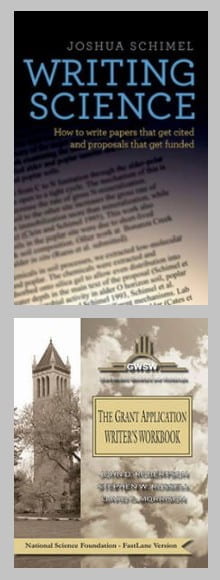Fall 2023
EEOB 8896.04 – Foundations of Ecology (Grad Seminar)

This seminar seeks to introduce an important subset of ecological concepts and to appreciate the evolution of those concepts. Students will gain a better understanding of how ecology has progressed as a discipline. To facilitate this, students will read and discuss papers from the peer-reviewed literature, both old and new.
Find a flyer with this information here [pdf].
Graduate Courses
 Scientific Writing in Evolution & Ecology: Two-part Graduate Series
Scientific Writing in Evolution & Ecology: Two-part Graduate Series
The goal of these courses is to help students improve their scientific writing ability. Session 1 (EEOB 6620) will emphasize writing scientific manuscripts, and Session 2 (EEOB 6630) centers on writing research proposals. During both courses, students will learn how to approach the writing process, practice writing, and learn to analyze their own writing and that of others.
Session 1: EEOB 6620 – Manuscript Writing (1.5 credits)
This course will focus on the nuts and bolts of effective manuscript writing (e.g., style, structure/organization, paragraph/sentence development, syntax/word choice), with the aim of teaching how to develop coherent, interesting scientific papers that will get cited. Joshua Schimel’s Writing Science: How to write papers that get cited and proposals that get funded will be the primary text.
Session 2: EEOB 6630 – Proposal Writing (1.5 credits)
This course will focus explicitly on developing an effective proposal. This course will provide a cookbook approach to writing the main components of a research proposal, using Stephen Russell’s and David Morrison’s The Grant Application Writer’s Workbook (found here) as a guide. The course will be geared to developing full NSF-style proposals; however, the lessons learned would benefit efforts to write any kind of proposal (e.g., NSF, GRF, candidacy exam, thesis, small grant application).
Undergraduate Courses
EEOB 3410 – Ecology
 This is a lecture-based undergraduate course where students learn basic ecological concepts from lectures, but then are asked to apply these concepts to novel, complex ecological problems. The course aims to challenge students to think beyond the facts and apply what they are learning. This course also has two weekly recitations, with one solely devoted to practicing math in ecology – a valuable skill for any budding ecologist.
This is a lecture-based undergraduate course where students learn basic ecological concepts from lectures, but then are asked to apply these concepts to novel, complex ecological problems. The course aims to challenge students to think beyond the facts and apply what they are learning. This course also has two weekly recitations, with one solely devoted to practicing math in ecology – a valuable skill for any budding ecologist.
The lab associated with this course introduces students to numerous methods in ecology, including design and analysis of experiments, computer simulation modeling, field sampling, conservation area planning, and qualitative ecosystem modeling.
Graduate Seminars
EEOB 8896 – Computer Programming for Ecologists (Grad Seminar)
 Computer programming can be extraordinarily useful, and occasionally necessary, for ecologists. This course introduces the foundations of computer programming by working through a variety of programming applications including, 1) automation of repetitive tasks, 2) database management, 3) permutation-based statistical analyses, and 4) construction of an individual-based ecological model. Most work involves Matlab, but students also have the opportunity to choose advanced topics latter in the course which includes an introduction to programming in R and learning to make animated figures.
Computer programming can be extraordinarily useful, and occasionally necessary, for ecologists. This course introduces the foundations of computer programming by working through a variety of programming applications including, 1) automation of repetitive tasks, 2) database management, 3) permutation-based statistical analyses, and 4) construction of an individual-based ecological model. Most work involves Matlab, but students also have the opportunity to choose advanced topics latter in the course which includes an introduction to programming in R and learning to make animated figures.
EEOB 8896 – Multivariate Statistical Tools for Ecologists (Grad Seminar)

This course introduces students to a variety of multivariate statistical techniques that could be used to help explain patterns in spatially-explicit and/or time-varied ecological data that comprise biological and/or environmental variables. Students will come to understand how these techniques work in a practical way. Using real datasets, students will learn 1) how to prepare data for multivariate analysis (e.g., how to choose data transformations and distance matrices, make decisions about when to discard outliers); 2) when it is appropriate to use each technique; and 3) what details need to be reported when writing manuscripts.